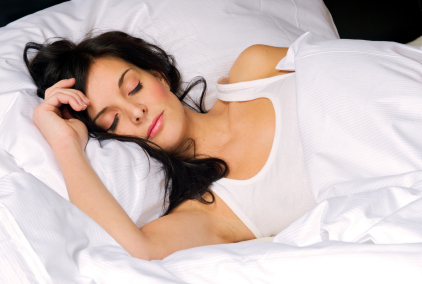
Stick to a consistent sleep schedule and routine. Go to bed at the same time each night and wake up at the same time each morning. A set sleep routine will “train” you to fall asleep and wake up more easily. Keep a sleep diary and chart your sleep for 2 weeks.
Use your bed only for sleep and sex.
Improve your sleep surroundings. Keep the television, laptop, mobile devices, bright lights, and any other distraction turned off or out the bedroom. This reinforces the idea that this room is meant for sleeping. An ideal environment is quiet, dark, and relatively cool, with a comfortable bed and pillow and minimal clutter. If you tend to “watch the clock”, turn the clock’s face away from view so you do not worry about the time.
If you’re still awake after 20 minutes in bed, get up and read awhile to relax until you feel sleepy. Otherwise, you’ll set yourself up for tossing and turning and being anxious of not being able to sleep.
Avoid caffeine and nicotine. Both are stimulants. Coffee, colas, certain teas, chocolate all contain caffeine, and its effects can take as long as 8 yours to fully wear off. Caffeine often means a sleepless night and can also increase the need to urinate during the night. Nicotine, acting as a stimulant, often causes smokers to sleep very lightly and to wake up early in the morning because of nicotine withdrawal. If you use tobacco in any form, you know your future health status – QUIT.
Avoid alcoholic drinks before going to bed. Alcohol depresses the nervous system, so a nightcap may help you relax in falling asleep. But this effect wears off after a few hours and often leads to waking up throughout the night. Alcohol can also worsen snoring and other sleep breathing problems (e.g. sleep apnea).
Avoid meals and beverages within 3 hours of bedtime. A light snack is OK. Drink only a small amount of water to take any nighttime medications. Evening fluid intake often causes you to wake up during the night to urinate.
Be physically active. Regular aerobic exercise like walking, running, or swimming provides three important sleep benefits: you’ll fall asleep faster, attain a higher percentage of restorative deep sleep, and awaken less often during the night. HOWEVER, do not exercise within 2-3 hours of retiring to allow your endorphins to return to a resting level, allowing you to relax.
Limit daytime naps. Prolonged napping can disrupt your natural sleep cycle and prevent you from feeling tired enough to fall asleep.
Try to avoid taking sleeping pills. Sleeping pills such as zolpidem (Ambien) or eszopiclone (Lunesta) do not induce the natural, large, deep-sleep brainwave activity. They target the same system in the brain that alcohol does, effectively knocking out the higher regions of the brain’s cortex. Sleep disorders should be evaluated to find an underlying cause. There are natural supplements and meditative techniques that may assist you in falling and remaining asleep.
If you would like more information about getting a good night’s sleep, contact Dr. Gordon C. Gunn MD at 714-912-2211 or visit www.gordongunnmd.com to schedule an appointment today.
Dr. Gunn proudly serves Fullerton and all surrounding areas.
